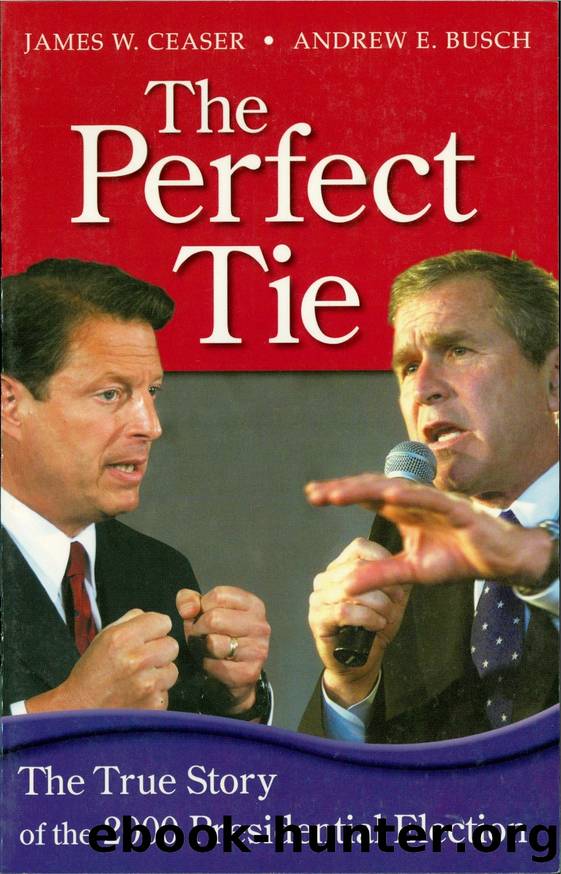The Perfect Tie by Andrew E. Busch & James W. Ceaser

Author:Andrew E. Busch & James W. Ceaser [Busch, Andrew E.]
Language: eng
Format: epub
ISBN: 9780585379357
Publisher: Rowman & Littlefield Publishers
Published: 2013-06-26T00:00:00+00:00
Phase One: George Bush Widens His Lead
Days after Bushâs selection of Cheney, Republicans formally launched their fall campaign with their national convention. National party conventions have historically served the major purposes of choosing the presidential nominee and the vice presidential nominee and deciding on the platform and party rules. They have served a host of minor purposes as well, including an assembling of party figures from across the nation to build party enthusiasm and establish personal ties. Today, of course, the conventions no longer perform any of the major functions in a robust sense. This fact now regularly brings forth on the eve of conventions a spate of lamentations from feature writers, who, in fits of peevishness or nostalgia, seem to think that these functions themselves have vanished from American political life. The reality, of course, is that they are now performed at another time and in another way. The choice of presidential nominees takes place in the primaries in February and March, often supplying all the suspense now missing from the conventions, as in the case of the dramatic contest between Bush and McCain. The discussion of the issues, which decides the platforms, now takes place in the debates during the primaries in December and January. It might, of course, be argued that these functions would better be performed at the convention, but no one has yet presented a sensible case for why they should be done twice.
In the old days, there was a rule of party discipline that was fairly widely respected, except in cases of the most intense conflict. It was simply that after all the fights and disputes of the party convention, party members should leave their battles behind and come together to support the nominee and the platform. What has been evolving in our times, slowly, is a similar rule, only with the time of application coming after the verdict of the primaries, rather than after the convention. For a good part of the past two decades, it is true, candidates who were defeated in the primaries proceeded as if they had a right to carry on their struggle and, if not sufficiently mollified by the nominee, to bring their complaints onto the floor of the convention and to deliver an uncensored convention speech. But it has become increasingly clear that putting this disunity on public display harms both the nominee and the party. The realization has thus dawned that, if a party wishes to win, its defeated candidates must limit their protests and be reasonably good soldiers. By and large, both John McCain and Bill Bradley did this, although Bradley took longer than McCain to meet with his partyâs winner.
The changed character of todayâs national party conventions is easily expressed in the formula that the convention, once the prelude to the campaign, is now part of the campaign. And as part of the campaignâindeed an important partâit must obey the campaignâs logic, which is to do whatever helps the candidate to win. The role
Download
This site does not store any files on its server. We only index and link to content provided by other sites. Please contact the content providers to delete copyright contents if any and email us, we'll remove relevant links or contents immediately.
The Secret History by Donna Tartt(16624)
The Social Justice Warrior Handbook by Lisa De Pasquale(11489)
Thirteen Reasons Why by Jay Asher(7788)
This Is How You Lose Her by Junot Diaz(5773)
Weapons of Math Destruction by Cathy O'Neil(5037)
Zero to One by Peter Thiel(4824)
The Myth of the Strong Leader by Archie Brown(4789)
Promise Me, Dad by Joe Biden(4447)
Beartown by Fredrik Backman(4419)
Stone's Rules by Roger Stone(4416)
How Democracies Die by Steven Levitsky & Daniel Ziblatt(4399)
The Fire Next Time by James Baldwin(4343)
100 Deadly Skills by Clint Emerson(4079)
A Higher Loyalty: Truth, Lies, and Leadership by James Comey(4033)
Rise and Kill First by Ronen Bergman(4012)
The David Icke Guide to the Global Conspiracy (and how to end it) by David Icke(3883)
The Farm by Tom Rob Smith(3872)
Secrecy World by Jake Bernstein(3782)
The Doomsday Machine by Daniel Ellsberg(3731)
